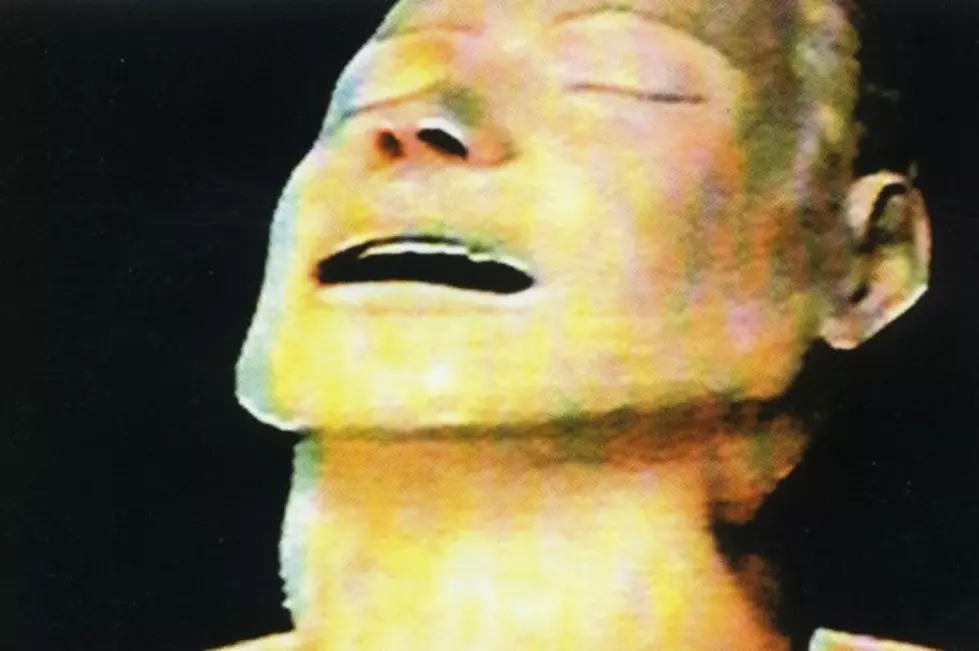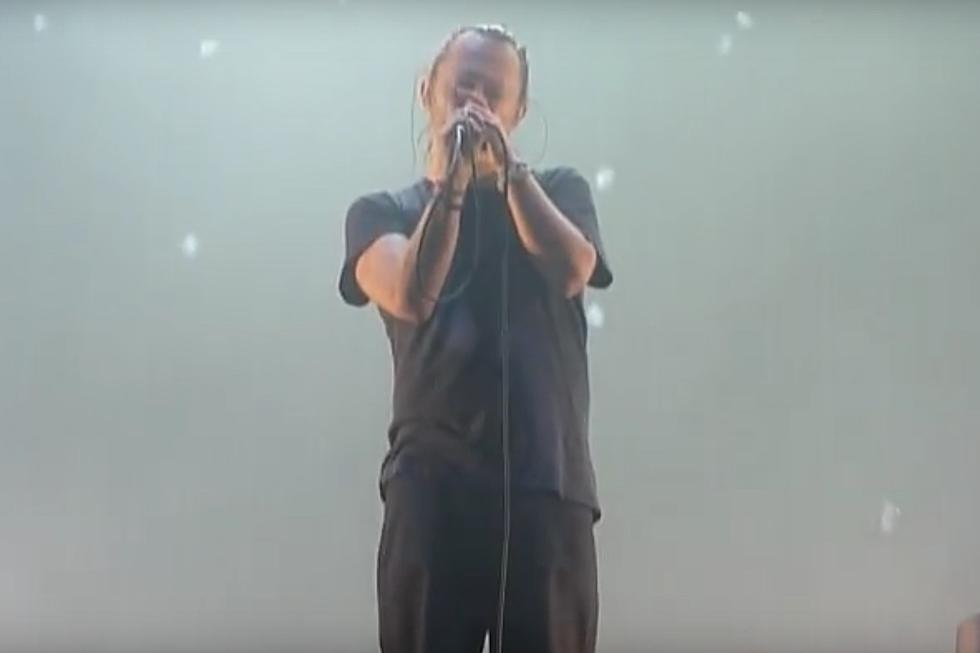
The Follow-Up: Radiohead’s ‘The Bends,’ 20 Years Later
In The Follow-Up, we usually take a look back at a record that was released immediately after a band’s biggest album. Although Radiohead’s most popular album is actually 1997’s OK Computer, we decided to instead focus on The Bends (the follow-up to their breakthrough 1993 debut) which, in addition to turning 20 this month, was a vital turning point in the band’s career.
It’s almost legally required of any respectable music fan in the 21st century to regard Radiohead’s sophomore album, The Bends, as a brooding masterstroke of post-grunge, pre-millennial brilliance. But that was far from true when the Oxfordshire five-piece released the album in 1995.
Although fans in the U.K. and critics on both sides of the pond quickly embraced the 12-track album – an intricate and atmospheric amalgam of arena rock and intimate British indie that blew away preconceived notions Radiohead established with their patchwork debut, Pablo Honey – The Bends was largely overlooked by finicky Americans in search of another “Creep.”
It wasn’t until Radiohead unleashed their third album and glitchy modern rock masterpiece, OK Computer, two years later that fans revisited The Bends and saw it for what it was: a necessary bridge between Radiohead's earliest pop conventions and their eventual role as the most fearless and influential band since Nirvana and the most artistically significant band to emerge from England since the Beatles.
'The Bends' is a necessary bridge between Radiohead’s earliest pop conventions and their eventual role as the most fearless and influential band since Nirvana.
But to fully understand how Radiohead (often described during their earlier days as “the most polite band in music”) would ascend to that elite echelon, you first have to look at where they came from – and that’s a prestigious all-boys private school in Abington where, in 1985, singer Thom Yorke, guitarists Jonny Greenwood and Ed O’Brien, bassist Colin Greenwood and drummer Phil Selway created the band mostly out of boredom. Although they would later joke about how awful they sounded in the beginning and eventually put the band – then known as On a Friday – on hold while they went to college, they reassembled in 1991 and promptly signed a six-album deal with EMI.
They released 3,000 copies of a four-song demo EP, Drill, under the Radiohead moniker in May 1992, then quickly jumped into the studio to record their first full-length, the patchwork and largely conventional Pablo Honey, in just three weeks. It garnered a smattering of attention from the British press when it dropped in early 1993, but everything changed when they re-released the single “Creep” (originally released prior to the album in 1992). A dynamic, Pixies-esque anti-anthem that Greenwood reportedly disliked so much he threw in the trademark pre-chorus guitar chugs in an attempt to ruin it, it was perfectly suited for the MTV-inspired Gen X self-loathing that ran rampant at the time. But the band (Yorke especially) quickly grew to resent the song and the expectations it set up in the minds of fans and label reps.
By the time Radiohead began thinking about their next album in 1994, they were perilously close to collapsing in on themselves. Already disillusioned with the industry and their unexpected place in it, the band vehemently rejected any allusions to being "Nirvana Lite" -- a common misconception drawn from the woeful grit of "Creep" -- and their penchant for keeping to themselves couldn't have been more opposite from the raucous rock star posturing of countrymen Oasis and Blur, who were in the midst of the Britpop Invasion.
Radiohead struggled mightily to find an approach to their sound that would not only appeal to the masses (the obvious preference of EMI) but also remain true to their restless creative spirit. Enlisting producer John Leckie (who had helmed the Stone Roses' self-titled 1989 debut and Ride's 1993 album Carnival of Light), Radiohead also teamed with engineer Nigel Godrich -- the man who would go onto produce every subsequent Radiohead album. Although the sessions were intense and strained, the band recorded a batch of songs for the My Iron Lung EP including the title track -- an overt reaction to the success of "Creep" as Yorke sings, "This is our new song / Just like the last one / A total waste of time." The song would also appear on The Bends.
Although the music-consuming public in the mid-'90s had grown accustomed to rock stars rejecting fame (Kurt Cobain took his own life the spring before the EP was released and Eddie Vedder had been stylishly skirting the spotlight for years), Radiohead seemed to be consciously alienating anyone who didn't care to consider the band's core motivation: to make music that would challenge everything. Instead of the jangly acoustic ballads and upbeat ditties on Pablo Honey, The Bends kicks off with spacey atmospherics and the glitchy electronics of "Planet Telex," setting the tone for an entirely new incarnation of Radiohead.
Yorke's songwriting began to shift from indie-type personal confessionalism into more cryptic fare with the sort of global themes and social commentary that would become intrinsic to the band's later work. At the same time, Greenwood (arguably the true musical mastermind of the band) began experimenting with more haunting and complex soundscapes ("Bulletproof... I Wish I Was," "Sulk") while the band soared on the strength of neo-classic rock ("The Bends," "Black Star") and delicate, hyper-melodic ballads ("Fake Plastic Trees," "High and Dry"). Although it's a rock album at its core, The Bends resonates far more deeply -- an innovative mixture of influences U2, R.E.M. and Pink Floyd but filtered through Radiohead's cerebral and increasingly distinct vision.
While the album was immediately acclaimed by the British press, Americans only familiar with "Creep" weren't as readily impressed. The Bends only reached No. 88 on the Billboard 200 -- their lowest appearance -- although the single, "High and Dry," charted as high as No. 78 on the Hot 100 -- one of their best showings to date. The album would make plenty of year end lists, but the widespread commercial appeal didn't come until Radiohead unveiled OK Computer in 1997.
With its emphasis on electronics and reinvention of the '90s sound, it brought Radiohead their first overwhelming comparisons to the Beatles and prompted many fans to revisit The Bends and rediscover its greatness in retrospect. In 2000, Virgin named it the No. 2 album of all time behind the Beatles' Revolver. Of course, that was before Radiohead would continue to delve further into the digital realm with 2000's Kid A, 2001's Amnesiac and the three groundbreaking albums they released after.
But the importance of The Bends isn't specific to Radiohead and their career. As one of the landmark releases of the '90s, it was hugely influential in guiding the music world out of the doldrums of grunge and past the generic ugliness of nu-metal. It's simultaneously ambitious and challenging but anthemic and accessible. Yorke and his falsetto provided a new template for frontmen who were still largely pounding their chests with the sort of faux-machismo propagated by the likes of Creed and Fuel. Without Thom Yorke, there likely never would've been a Chris Martin of Coldplay or Justin Vernon of Bon Iver.
Although some of the songs on The Bends sound simplistic and almost quaint when compared to the uncharted sonic territory they would go on to traverse, it's still an incredibly listenable record that still feels fresh two decades later. But when you consider its role in the development of the world's most innovative band, its significance can never be overstated.
More From Diffuser.fm









